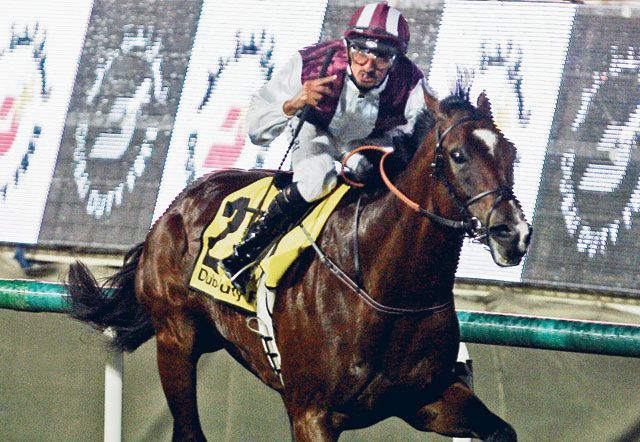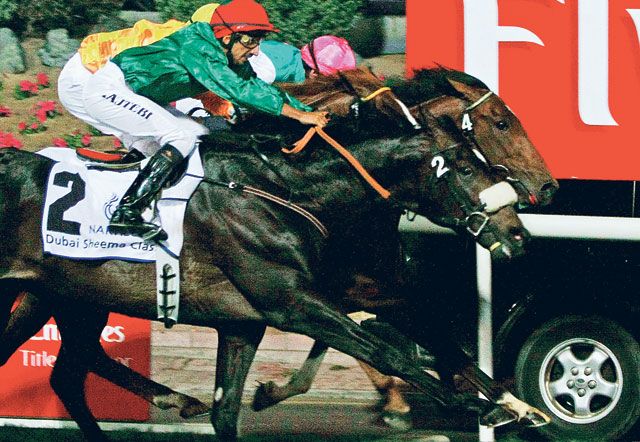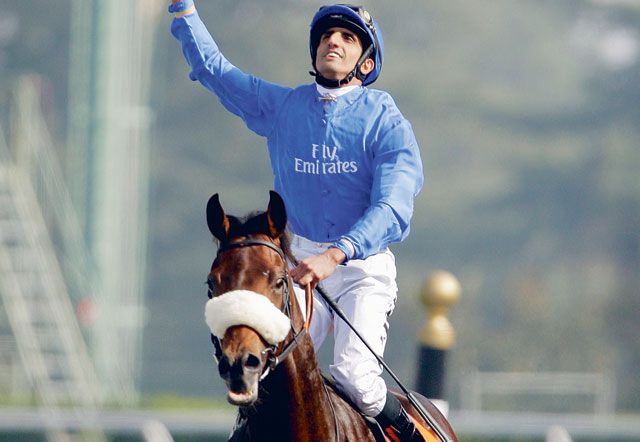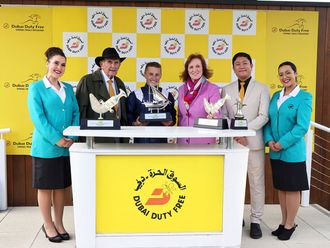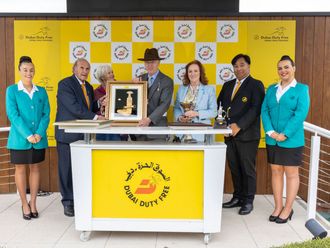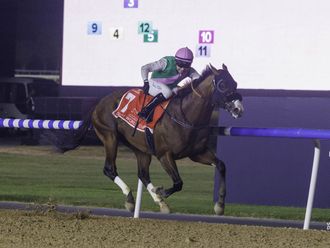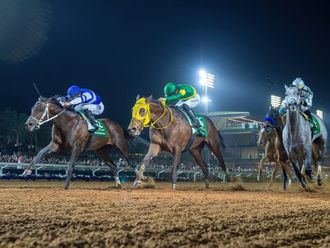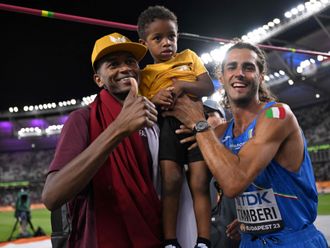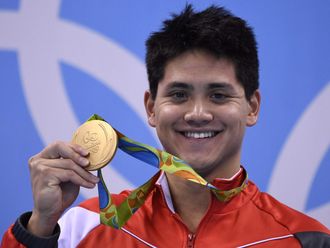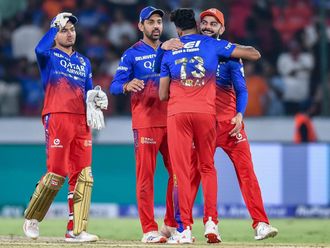If the world of horse racing were so predictable that jockeys with big leads always won a race, if horses that leapt out in front from the stalls always finished first, if both horse and jockey were so much in the zone that they always stayed there well, then sports writers would go out of business.
I mean, how interesting can it be?
Perhaps, the word we are looking for is momentum.
On the face of it, it's a phenomenon that's quite easy to explain: momentum is a product of mass over velocity.
But in sport it is an occurrence that can be diced in many ways. Like, for example, how on earth did India get dumped out of the 2007 World Cup after being pitted against Bangladesh, Sri Lanka and Bermuda?
Backward momentum?
Then there was Ireland. Known for all good things other than being a nation of cricketers, they found a unique energy in the same tournament by reaching the ‘Super Eight' stage despite being pitted against Zimbabwe, Pakistan and the hosts West Indies.
Umm… forward momentum?
On the other hand momentum can be mysterious. Like for instance, how on earth did Eric ‘the Eel' Moussambani manage to become so famous in the 2000 Sydney Games despite finishing the 100metres freestyle in 1:52.72, a time that is even outside the 200metres world record?
Well, that's momentum for you. The one thing that we are sure of is that nobody in sport gets ahead, or behind, without it.
And then suddenly there is also that much-awaited occasion when along comes a competitor who rocks the boat with mindnumbing performances. Everyone's now aware that there's a new kid in town and he's determined to make waves.
How should we label this phenomenon? Like in the case of UAE jockey Ahmad Ajtebi?
Ajtebi's rise and rise in the highly competitive world of horse racing has been nothing short of phenomenal. A camel rider-turned-jockey at the ripe old age of 22 (the world of horse racing looks upon it as old), Ajtebi first ran away from the opposition at Royal Ascot, on board Royal Parade in 2008. He then blew a hole wide open in the Dubai World Cup this year by first winning from the front ($5 million Dubai Duty Free) and then from the rear ($5 million Dubai Sheema Classic).
Notice had definitely been served. But the UAE's first home grown rider went one better: Ajtebi dumped his challengers at the Breeders' Cup Juvenile race with Vale Of York in November. The Emirati's best performance so far, till he turned into a full-fledged jockey, was to record 200 winners in 3,000 camel races.
How do we account for such paranormal outcomes and achievements?
Let us simply say that the momentum has shifted.
And this is why he is our Sportsman of the Year.
Ajtebi lives in Dubai, but each time he wants to rediscover the man inside the jockey he retreats to his farm located somewhere after an innocuous looking right turn on the highway that snakes from Dubai to Hatta.
If you blink on an otherwise regular day you might miss this important right turn. But Ajtebi is precise with directions. Soon a reporter, a photographer and a videographer are waiting at a desolated spot, which separates the road from the sprawling red sand dunes by a few metres.
In the distance one can see a miniature tornado approaching us. It is our protagonist and the engines of his Ford F150 pickup are belching out columns of sand in the air.
"I love speed," says Ajtebi after he brakes in front of us. "Get in," he instructs "We have to go further into the desert." The engine revved up and started to scream as Ajtebi swallowed every approaching sand dune like he had a vendetta against them. Speed is nothing without control and with every dune negotiated we began to understand the true concept of managing horse power. This diminutive jockey extracted every last ounce of venom from his vehicle like he would do with a thoroughbred in a race.
And then suddenly, as if a fog of sand had been lifted, his falcon farm and camel pens were visible in the distance. We were soon parked in front of it.
"This is where I come when I am back home. I come here to relax," he said with a wide wave of his hand as if to embrace the desert and the wind that blew across it. "I don't come here all the time, but maybe in winter because the racing season begins in Dubai. I relax and get back fresh to the races."
‘A lot to do'
As if the races are an exam? "Well, there is a lot to do before each race," he confesses. "I study the horse, his form and get into every relevant detail. You have to know every jockey in the race and his style of riding… does he ride from the back? Or is he a frontrunner? These details are important, especially if you ride in England where the weather can change in five minutes.
"But when I am here I try to run away from all that… with friends and family. My son is nearly seven years old now and I to bring him to the desert and teach him all that my father had taught me: how to work with camels, with falcons and all the things that are close to my culture."
The air miles that he has collected travelling from one racecourse to another have clearly not taken Ajtebi away from his roots. He sticks to them when he is on ground zero. "This is what I always tell my son: be in touch with your culture. My father taught me that. And if you want to learn, then mingle closely with your elders. They are the best teachers."
Time is Ajtebi's biggest enemy. Sometimes it thwarts all his good intentions. The life of a professional jockey is lived out in equal parts on the back of a horse, in an aeroplane, or in driving from one racecourse to another.
The travel along with the ambition to win consistently creates a pressure cooker situation in the mind. And being the sole Emirati jockey can make the burden reach unmanageable proportions.
Ajtebi shrugs it off, saying: "There is no pressure. When I wasn't well known nobody cared where I went and when I returned. It was the beginning of my career. I was riding maiden and handicap races so I was still learning. I am still learning except that now I have to be more prepared because the focus is on me. People trust me with a responsibility and I can't put a foot wrong. I must trust my skills and use my training.
"I am still beginning," he offers. "I don't want to rate myself anywhere. I am aware that I have some great wins in my career but they are not enough. I don't just want to win the Dubai World Cup, or the Breeders' Cup and say that this is enough. I just want to put my head down and go to ride the next day. Forget about yesterday and focus on tomorrow.
"When I jump on the horse I sometimes get angry and think, ‘why didn't I get more winners from the day I started?' I want to give each horse, owner and trainer a chance… you have to give something back to them for trusting in your abilities."
This generous spirit helps Ajtebi keep victory and defeat in perspective.
"Irrespective of whether I finish at the back, or in the front, I just want to know if I have done the job according to my brief. If I get beat then that's racing. There is more than one horse in the race and somebody will finish first and somebody last. I need to ensure that I have given my owner and trainer what they have asked from me. If I lose to better horses then it's the race. If it's the trip that matters then I will debrief the trainer that he needs to change the horse's distance. If the mistake is mine then I analyse the tapes and try to rectify the errors."
In helping him realise his goals, Ajtebi has quite a broad support base. "There are so many people who are willing me to succeed. The first of course is His Highness Shaikh Mohammad Bin Rashid Al Maktoum, Vice-President and Prime Minister of the UAE and Ruler of Dubai. He changed my life by sending me to 12 different countries to help me pick up the tools of my trade. I went to the jockey's club where I learnt everything from A to Z. I have well-wishers in the Emirates Racing Association, the jockey club and Yasir Mabrouk, who has been with me from the beginning.
"There is the media as well," added Ajtebi. "Gulf News has been with me from the start of my career. I have each and every clipping of Gulf News that features me."
Ajtebi lists every significant facet of his life as a jockey down to learning. Bear in mind he started at an age when most jockeys had already serviced their engines.
"My father was a camel trainer," he said, putting his background into perspective. "When I was 14 years old I focused on breeding and going to the camel pens. I used to race camels as well. When I was 22, Shaikh Mohammad changed my life by asking me if I wanted to try something new. He sees things others don't see. He said that Dubai had offered everything to horseracing except an Emirati jockey. Till then I never sat on a horse in my life!
"I went to jockey school where I learnt everything. I started from zero… as a groom. And I learnt more than just to ride. I learnt to speak English. It's important, especially when you have to study the declarations on race day, the entries and form guide. You just can't sit on a horse and ride from start to finish."
Horse racing can be as technical as one wants it to be. Which is why it is endearing to note that Ajtebi imparts a healthy dose of simplicity to his chosen trade.
Still dreaming
The goals ahead are simple: "I want to win the Dubai World Cup," he said in a matter-of-fact way while taking the hood of a falcon and releasing it in pursuit of a helpless pigeon. "Maybe this year with Meydan coming up?" he looks in askance…
… Maybe.
I asked him to paint a picture of his emotions after he won two Group 1 races at this year's World Cup meeting. Had the finish line to his ambitions been extended since?
"I learnt then that there is no limit," he said. "I was happy, not just for myself but for all those who had supported me. Shaikh Mohammad gave me the horse to ride that night. By winning I could show only a fraction of my appreciation."
There was another man watching from the grandstand that day. His name was Ahmad Sultan Ajtebi.
"He's my father. He always told me that this is what it was all about — to work hard for results. Our eyes locked after the race and I could see that he was happy…
"He passed away a few months ago."
Far be it for me to imagine Ajtebi's mindset when he is locked up with his horse and waiting for the starter's orders, in the stalls, but off the track perhaps his ‘soft skills' are his greatest asset. His humility and forthright manner are powerful requisites in a sport well known for exclusivity and arrogance.
"I want to be seen as a jockey who rides for his country and plants the UAE's national flag across every racecourse in the world," Ajtebi said.
He's on his way to doing that.
Now it's all a question of momentum.


